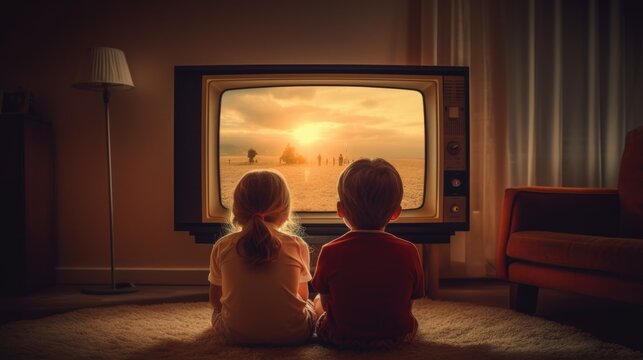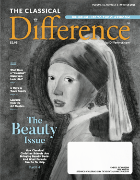HBO is telling stories that become social justice movements.
Parents have a big job. If you’re a classical, Christian parent, that job is bigger. The real burden of this sort of education is shouldered at home and around the dinner table. You digest the day’s lessons, manage sibling debates, and contextualize homework assignments (and admonish petty complaints). Yet after those eternal souls are tucked in bed, your work continues; tomorrow is coming, and you have to be prepared. One of those many tasks is to stay ahead of the competing ideas your children will face. Even the most tech-resistant clan still encounters friends and family members who watch Netflix, have iPhones, and may have downloaded Tik Tok once upon a time. Stories swirl outside your door, and if your children will be educated, they must venture through that door and face that danger on a daily basis.
Staying ahead of storytelling is daunting. You couldn’t possibly read every book published each year. And even if you had the desire, your life isn’t long enough to watch every show or movie produced. So parents must be efficient. Who are the most lauded storytellers? Who are the writers crafting plot and character? Who are the actors providing heralded performances? Who are the investors with the deepest pockets scrambling to turn cash into profits? What studios turn audience eyes into gold? What soulfood are the storytellers seeking to feed your children?
To answer these questions, you might turn your gaze on a single source: HBO. HBO—or Home Box Office, its formal title—is the pay television network that is the home of “prestige television.” For nearly 30 years, HBO has created shows and movies that somehow enter the zeitgeist with such strength, it seems like those stories always existed. Al Capone who? Try Tony Soprano. Fans of Aragorn 20 years ago might now be more interested in Jon Snow from Game of Thrones. And if you type “Prestige TV” into Google, you’ll basically find a list of HBO productions. With the Warner Brothers-Discovery merger, HBO is also poised to be one of the largest streaming services available through the rebranded service “Max.” These are the stories that have commanded the most attention, the most money, the most awards for the better part of two generations. And recently, these stories have fueled social justice movements.
Big Little Lies was one such story, a murder mystery with a starry cast (Reese Witherspoon, Nicole Kidman, Laura Dern) which, at face value, was a condemnation of domestic abuse. The details are less praiseworthy: a group of school moms band together to conceal from the police the name of a friend who kills one of their husbands who was secretly abusive. When it premiered in early 2017, critics were nearly universal in their acclaim. The creatives and producers garnered 16 Emmy Award nominations, winning eight statues. Acceptance speeches glowed with affirmations for victims and praise for those who shed light on abuse. Season 2 attracted even more star power in the form of Meryl Streep.
Big Little Lies won “Outstanding Limited Series” on September 17, 2017. On October 15, actress Alyssa Milano encouraged the use of #metoo on Twitter, and the rest is history.
Two years later, HBO did it again. Its hugely anticipated continuation of Watchmen premiered on October 20, 2019 with a captivating opening sequence which even history students found puzzling. The series’ examination of racial tensions based on past events began with a retelling of the 1921 Tulsa Race Massacre. The next day, the entertainment section of most newspapers and web pages ran articles titled something like, “What was the Tulsa Massacre and why didn’t they teach us about it in school?” This horrific event may have been glossed over by most textbooks, but Watchmen brought it front and center in the public’s imagination, centering it as the focal point of modern racial tension, within the story of the series, and in our own.
This time, America didn’t wait for the Emmy Awards. After the murder of George Floyd in May 2020, the Black Lives Matter movement roared back onto the scene and our screens. The Tulsa Massacre was clearly on the minds of creative professionals from coast to coast. (For the record, it received 26 2020 Emmy nominations, and won 11; its wins nearly mirror those won by Big Little Lies.)
In both cases, these social justice movements began years before the shows incited their rebirth. “Me Too” was first used in 2006, and Black Lives Matter formed in 2013. But it took story to turn phrase into action, and those actions had significant consequences on American culture and its children.
The 2023 Emmy Awards were held on January 15, 2024, and HBO and Max, its streaming service, received 31 trophies, more than any other network.
Part of parenting is deciding what content your children are capable of viewing and what content you allow into your home.
Some content can be written off completely as obscene, grotesque, or outright nonsense. The observations here are not given to encourage Christians to support or promote material that may tempt them to sin or become sin voyeurs. But our students—perhaps even your children—are viewing this content, and they are certainly affected by the consequences of it. Hopefully, someone else is watching, too, and can help our students interpret these stories in the light of a Christian worldview. Parents, investigate the stories HBO is telling first so you don’t have to play catch up with your children.
STAY INFORMED
Focus on the Family provides reviews and context for Christian parents through Plugged In.
IMDB parent reviews and content warnings can help you with some basic information, though quality can vary depending on the author (See IMDB site).
N.D. Wilson and Brian Kohl keep an eye on stories and media through the Stories are Soulfood podcast.
 ~George Jaggers is Head of School at New Covenant Christian School in Abingdon, MD.
~George Jaggers is Head of School at New Covenant Christian School in Abingdon, MD.













Thanks for the article.